

There’s no emotion we ought to think harder about than anger. Lay Definitions of Happiness across Nations: The Primacy of Inner Harmony and Relational Connectedness. The Data Against Kant. Prolific Academic – Find participants fast. Anger, contempt and disgust fuel hostility, new research shows. Individuals experiencing anger, contempt and disgust are more likely to act and behave in a hostile manner toward those they disagree with, new research from San Francisco State University shows.

Past research had demonstrated an association between these emotions, collectively known in the field as ANCODI, and hostility, but the new study published today in the Journal of Applied Social Psychology is the first to prove the connection. The findings have important implications for a variety of fields, including politics and law enforcement. The problem with cognitive and moral psychology. Cognitive science isn't epistemology, and moral psychology isn't ethics.
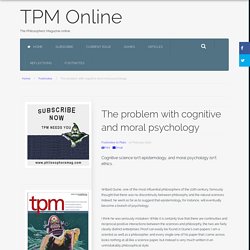
Manipulating word awareness dissociates feed-forward from feedback models of language-perception interactions. We investigated whether language affects perception in a feed-forward or a feedback manner by disrupting the processing of motion words by means of backward masking.
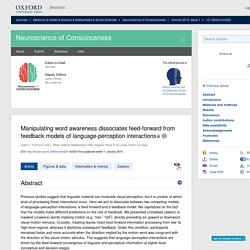
The rationale behind this experimental design is that feedback processing is disrupted by masking, as revealed by empirical evidence from monkey electrophysiology and human neuroimaging studies (Lamme and Roelfsema, 2000; Lamme et al., 2002; Del Cul et al., 2007; Fahrenfort et al., 2007). Hence, the feedback model predicts that interactions between language and perception will be abolished under masked conditions. What kinds of actions do people think of as most stupid? To avoid people thinking you're stupid, above all you need to refrain from undertaking risky tasks for which you lack suitable knowledge or skills.

That's according to new research published in the journal Intelligence, which is the first to systematically investigate the kinds of behaviours that people consider to be stupid or foolish. Balazs Aczel and his colleagues collected online news stories that contained descriptions of stupid behaviour, for example from the New York Times, the BBC and the gossip site TMZ. They also asked 26 university students to keep a diary for five days of incidents they experienced that involved people acting stupidly. Moral Dispute or Cultural Difference? "Thinking too much": A systematic review of a common idiom of distress.
What do philosophers think? — Part II. Philosophers tend to develop coherent views of their discipline.
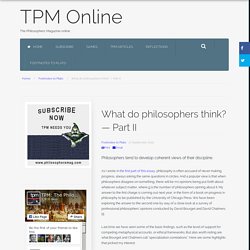
As I wrote in the first part of this essay, philosophy is often accused of never making progress, always asking the same questions in circles. And a popular view is that when philosophers disagree on something, there will be n+1 opinions being put forth about whatever subject matter, where n is the number of philosophers opining about it. My answer to the first charge is coming out next year, in the form of a book on progress in philosophy to be published by the University of Chicago Press.
Ancient vs modern ethics: a comparison. Ethics — as a branch of philosophy — means a very different thing today than it did once.
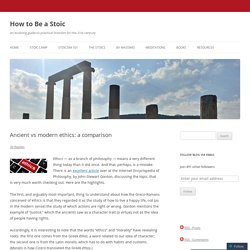
And that, perhaps, is a mistake. There is an excellent article over at the Internet Encyclopedia of Philosophy, by John-Stewart Gordon, discussing the topic, that is very much worth checking out. Where microaggressions really come from: A sociological account. I just read the most extraordinary paper by two sociologists — Bradley Campbell and Jason Manning — explaining why concerns about microaggressions have erupted on many American college campuses in just the past few years.
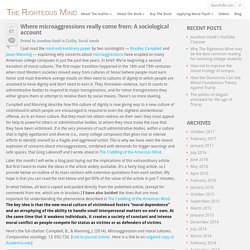
In brief: We’re beginning a second transition of moral cultures. The first major transition happened in the 18th and 19th centuries when most Western societies moved away from cultures of honor (where people must earn honor and must therefore avenge insults on their own) to cultures of dignity in which people are assumed to have dignity and don’t need to earn it. They foreswear violence, turn to courts or administrative bodies to respond to major transgressions, and for minor transgressions they either ignore them or attempt to resolve them by social means. There’s no more dueling.
Later this month I will write a blog post laying out the implications of this extraordinary article. Here’s the full citation: Campbell, B., & Manning, J. (2014). From Schadenfreude to ringxiety: an encyclopedia of emotions. Emotional and Utilitarian Appraisals of Moral Dilemmas Are Encoded in Separate Areas and Integrated in Ventromedial Prefrontal Cortex. Cendri A.
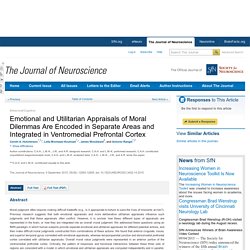
Hutcherson1,3,*, Leila Montaser-Kouhsari1,*, James Woodward4, and Antonio Rangel1,2 +Show Affiliations Author contributions: C.A.H., L.M. -K., J.W., and A.R. designed research; C.A.H. and L.M. -K. performed research; C.A.H. contributed unpublished reagents/analytic tools; C.A.H. and L.M. The Journal of Neuroscience, 9 September 2015, 35(36): 12593-12605; doi: 10.1523/JNEUROSCI.3402-14.2015 Moral judgment often requires making difficult tradeoffs (e.g., is it appropriate to torture to save the lives of innocents at risk?). Feeling Awe May Be Good for Our Health. Negative emotions have been linked to poor health outcomes, such as heart disease and even a shorter life span.

Research suggests inflammation may be responsible for this link, at least in part. The molecules involved in inflammation are essential for our body's response to infection and injury, but high levels over the long term have been linked to everything from diabetes to depression. Few studies have assessed the health effect of positive emotions, so a team led by Jennifer Stellar of the University of Toronto (who also began studying awe in Keltner's lab at U.C. A Religious Worldview. Protecting One’s Meaning System Through Religious Prejudice Joanna Goplen, State University of New York at Oswego, 402, Mahar Hall, 7060 Route 104, Oswego, NY 13126-3599, USA.
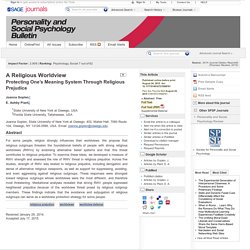
Email: joanna.goplen@oswego.edu Abstract For some people, religion strongly influences their worldviews. We propose that religious outgroups threaten the foundational beliefs of people with strong religious worldviews (RWVs) by endorsing alternative belief systems and that this threat contributes to religious prejudice. Article Notes. Here's the Philosophy Essay Vox Found Too Upsetting to Publish. Thinking, Fast and Slow? Some Field Experiments to Reduce Crime and Dropout in Chicago. NBER Working Paper No. 21178Issued in May 2015NBER Program(s): CH ED This paper describes how automatic behavior can drive disparities in youth outcomes like delinquency and dropout.
We suggest that people often respond to situations without conscious deliberation. While generally adaptive, these automatic responses are sometimes deployed in situations where they are ill-suited. Although this is equally true for all youths, disadvantaged youths face greater situational variability. This increases the likelihood that automaticity will lead to negative outcomes. A non-technical summary of this paper is available in the July 2015 NBER digest. This paper is available as PDF (3474 K) or via email. Common Knowledge and Aumann’s Agreement Theorem.
The following is the prepared version of a talk that I gave at SPARC: a high-school summer program about applied rationality held in Berkeley, CA for the past two weeks. I had a wonderful time in Berkeley, meeting new friends and old, but I’m now leaving to visit the CQT in Singapore, and then to attend the AQIS conference in Seoul. Common Knowledge and Aumann’s Agreement Theorem August 14, 2015.
Psycnet.apa. Where is psychology's non-stick frying pan? Psycnet.apa. The dangerous allure of victim politics. Moral Traits, Not Memory, Considered Core Component of Our Identity. Existentialslides11.